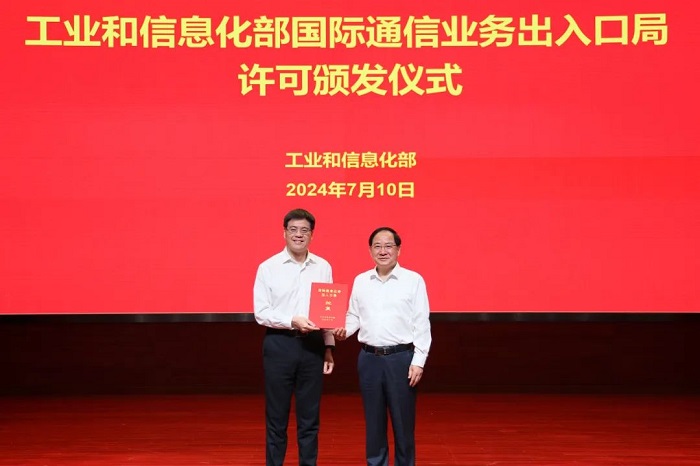China grants licenses to new international communication gateway bureaus

Jin Zhuanglong (right), minister of industry and information technology, granted a license to Chen Zhongyue (left), chairman of China Unicom, in Beijing on July 10, 2024. [Photo provided to chinadaily.com.cn]
The Ministry of Industry and Information Technology, China's top industry regulator, on Wednesday granted licenses to Chinese telecom companies, such as China Telecom, China Mobile and China Unicom for establishing international communication gateway bureaus in four cities across the country.
The move is China's latest push to accelerate the construction of international communication infrastructure for the Belt and Road Initiative.
Jin Zhuanglong, minister of industry and information technology, said the four international communication gateway bureaus, which serve as key international communication hubs connecting global networks, will be located in Nanning, Guangxi Zhuang autonomous region; Qingdao, Shandong province; Kunming, Yunnan province; and Haikou, Hainan province.
Jin said these bureaus are essential information infrastructure supporting China's external exchanges. China prioritizes the development of international communications and has proposed the construction of the Belt and Road multidimensional connectivity network, providing fundamental guidelines and clear directions for the establishment of new international communication gateway bureaus.
China's international communication infrastructure has made significant progress. The strategic layout of the international communication gateway bureaus has been gradually established, creating a communication cable network that covers the Asia-Pacific region, North America, and other countries and regions involved in the Belt and Road Initiative. This network has effectively supported the development of the digital economy and international cooperation and exchanges, according to MIIT.
Jin urged leveraging the establishment of new international communication gateway bureaus as an opportunity to support deepened opening-up of telecommunications services, facilitate cross-border data flow and promote the development of international digital trade.














